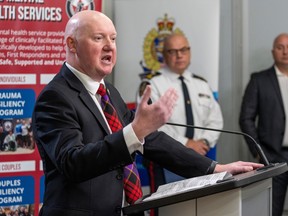After the tragedy: Who responds when first responders need help?
Wounded Warriors, which offers mental health training and support to police, fire services and paramedics across Canada answered a call from Ottawa police today

Published Mar 07, 2024 • 2 minute read
Scott Maxwell’s phone rang early Thursday morning with news of the dreadful tragedy in Barrhaven.
Maxwell’s not a first responder, but his job as executive director of Wounded Warriors Canada makes him more of a first responder’s responder.
Article content
The call came from a member of the wellness team of Ottawa Police Service, whose officers had been called to a bloody home where they found the bodies of six people, four of them children. Wounded Warriors, who had partnered with Ottawa police just before the pandemic, would be ready to help with the emotional and psychological fallout.
THIS CONTENT IS RESERVED FOR SUBSCRIBERS ONLY
Subscribe now to read the latest news in your city and across Canada.
Exclusive articles from Elizabeth Payne, David Pugliese, Andrew Duffy, Bruce Deachman and others. Plus, food reviews and event listings in the weekly newsletter, Ottawa, Out of Office.Unlimited online access to Ottawa Citizen and 15 news sites with one account.Ottawa Citizen ePaper, an electronic replica of the print edition to view on any device, share and comment on.Daily puzzles, including the New York Times Crossword.Support local journalism.SUBSCRIBE TO UNLOCK MORE ARTICLES

Subscribe now to read the latest news in your city and across Canada.
Exclusive articles from Elizabeth Payne, David Pugliese, Andrew Duffy, Bruce Deachman and others. Plus, food reviews and event listings in the weekly newsletter, Ottawa, Out of Office.Unlimited online access to Ottawa Citizen and 15 news sites with one account.Ottawa Citizen ePaper, an electronic replica of the print edition to view on any device, share and comment on.Daily puzzles, including the New York Times Crossword.Support local journalism.REGISTER / SIGN IN TO UNLOCK MORE ARTICLES
Create an account or sign in to continue with your reading experience.
Access articles from across Canada with one account.Share your thoughts and join the conversation in the comments.Enjoy additional articles per month.Get email updates from your favourite authors.or
Article content
“We let them get through the day. They’ll do their internal support briefings and debriefings. When we’re needed is not the day of,” he said. “It’s the days after, when attention is no longer being paid to that incident, but it lives on for the first responders.”
Founded in 2013 to help returning military veterans from the Afghanistan war and their families, Wounded Warriors has since expanded to offer mental health training and support to police, fire services and paramedics across Canada. While soldiers tend to experience brief intense trauma incidents — a bloody firefight, for example — first responders are more likely to endure sustained, unrelenting stress over the course of their careers. Regardless, the effects on the sufferer of post-traumatic stress or operational stress injury are remarkably similar, Maxwell said.

Wounded Warriors’ programs help in two ways, by proactive training to help people better prepare for trauma, and afterwards to help treat the wounds it leaves. It also provides support for first responders’ families, who often deal with the effects of trauma too.
Article content
Bill Winogron, a psychologist with Wounded Warriors, likens the training to inoculating someone against disease.
“The underlying principle is we can teach people to prevent trauma to themselves. For me, that’s a much more interesting approach than waiting until trauma has happened,” Winogron said.
“You want people to recognize that they’re becoming disturbed. There’s a morality among first responders that is ‘Don’t be injured.’ They don’t want to feel weak. So very often with first responders, we find they wait too long to get help.”
Everyone’s response to a trauma like the Barrhaven horror will be different, he said. That children were among the victims, makes it even more disturbing for officers, he said.
“If you have 100 different people you will have 100 different reactions. After the fact we do trauma-informed therapy to help them process what happened, how to make peace with it and how to self-regulate.”
Maxwell says Wounded Warriors’ work with Ottawa police won’t end when the investigation is complete and officers begin new shifts.
“We stay in touch,” Maxwell said. “We know that people will almost invariably need more assistance. And who can they call? They can call us.”
Recommended from Editorial
How should parents talk to their kids about a mass killing involving children?
Context: A history of previous multiple homicides in the Ottawa area
Article content









































